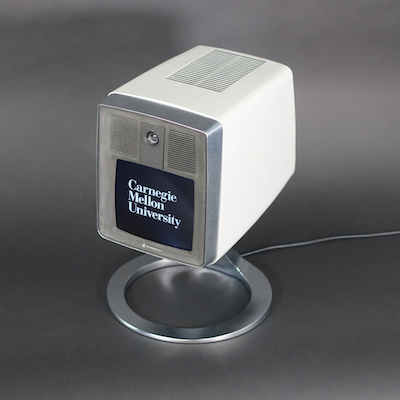
Special Collections at Carnegie Mellon University Libraries continues to grow distinctive and unique holdings relating to the history of science and technology. These collections incorporate scientific instruments and calculating machines, including a Thomas Arithmometer, Curta Type I Calculating Machine, two Enigma machines, and two AT&T Mod II Picturephones (serial numbers 700000339 and 71000139).
The Picturephone Mod II was a technological marvel. Its 5.5 x 5 inch screen offered full-motion black and white picture with 250 lines resolution at 30 interlaced frames per second (horizontal scan rate of 8 kHz). The device also contained an innovative silicon photodiode array camera with a resolution of 0.8 megapixels; a small integrated mirror could be flipped allowing it to transmit either the user or documents laid in front of the device. The picture tube and integrated circuits were made at the Western Electric plant in Reading, PA. For transmission, the Picturephone required three twisted pairs of ordinary telephone cable, two pairs for video and one for audio and signaling. Picturephones could also "call" mainframe computers and render rudimentary graphics, with user input provided via a phone's number keypad.
One of the CMU Picturephones has been non-destructively modified to run modern video conferencing software, offering an interactive experience connecting new to old.
The Picturephones served as the inspiration for the June 30, 2020 event 50 Years of Video Calling, in which current Pittsburgh Mayor William Peduto and Alcoa Chairman Michael G. Morris conversed via video, as their predecessors did a half century ago on their inaugural call over the world's first commercial video conferencing service. Read a recap of the event and view the recording.
Partnering with HOST@CMU, a cross-campus, interdisciplinary initiative aimed at uncovering, clarifying, and celebrating CMU and Pittsburgh's unique historical contributions to scientific and technical development, Special Collections is committed to the study and preservation of the technological heritage of Pittsburgh and Carnegie Mellon University.
